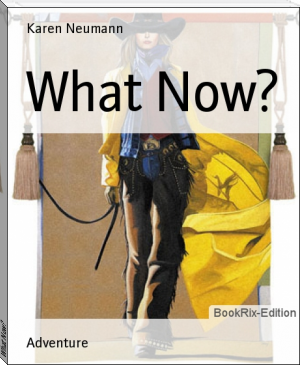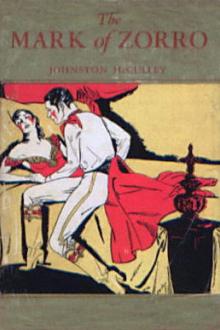What Now? by Karen Neumann (beach books TXT) 📕

Read free book «What Now? by Karen Neumann (beach books TXT) 📕» - read online or download for free at americanlibrarybooks.com
- Author: Karen Neumann
Read book online «What Now? by Karen Neumann (beach books TXT) 📕». Author - Karen Neumann
What now? She asked herself starring at the blood now turning sticky on her hands. Her gaze traveled to the body on the floor, unmoving and seeping blood from the wounds in his arm and torso; blood that shimmered cranberry in the oil lamplight. Move! Cassie gingerly stepped around the body and quickly changed from her nightdress into her uncle’s old trousers, button down shirt, mud caked boots and threadbare jacket; thank goodness he was not a large man! She hurried out of her bedroom shutting the door quietly behind her so not to awaken anyone else in the house. Heading into his room, she opened the wardrobe, pushing the clothes aside to expose the secret door. Using the bloodstained knife, she pried open the door and took her share of the money. Swiftly moving to the bureau, she grabbed his pearly handled colt 45 pistols and a rifle that was leaning behind the door. She could get more ammunition later, she needed to be on her way. Tip-toeing down the stairs, minimizing the creaks, she hurriedly grabbed bread, apples and cheese from the kitchen on the way to the stable. She stopped by the trough and rinsed her bloody hands clean, watching the redness disappear in the clear water. Saddling a riding horse, she bridled a pack horse as well, throwing on a few camp supplies until she could get to an outpost and stock up. She had money to do that now, her money. Without a second thought or a twinge of remorse, she headed west out of New Orleans.
She rode hard for a week; stopping only after dark. She feared she would be followed by the law or worse. Exhausted, she would tend to the horses, eat and sleep claimed her as her head hit the bed roll. She was halfway through Texas and it was still fairly warm in September but she had to get to the mountains before the first snow. She had to keep pushing hard and put as much space between her and the south as she could if she expected to survive.
She reached the foothills of northern New Mexico the second week of October and so far she had beat the snow. She asked about the mountain trail at the last outpost and they had obliged but told her she was going to have to hurry to beat the snow or it would be impassable. Telling them she was with a wagon train had allayed their suspicions of a woman traveling alone in the wilderness. Luckily for her, westward pioneers had just been through a few days before. She hoped her luck would hold.
It was beautiful at the base of the mountains, hardwood forests in brilliant oranges, siennas and maroons, pines along the ridges and stone formations jutting outward; all set against the deep blueness of the sky. So enchanted with the radiance of nature encompassing her, it took her a moment to place the sound. A foreign, ugly sound that did not match the serenity of the setting. Laughter and screaming; demented laughter.
Following the sounds, she dismounted as she drew near. Tying her horses to a birch tree and losing her hat, she crouched low, advancing in the bushy undergrowth, pulling a 45 from her holster. Her eyes narrowed and her stomach churned as she took in the torture. Two white men were knife carving the flesh of two Indians they had tied to trees. The white men were laughing gleefully at the task at hand, feeling nothing but their own pleasure through the pain of others. She knew what this felt like and done to her by her fellow man as well. Drawing the other pistol, she stood, revealing herself to the men. The men turned, surprised at first but seeing she was white, did not feel threatened even by the presence of her pistols. Their mistake. “You will need to put your knives down,” she stated in a stern, even tone, commanding the situation and even surprising herself. They laughed. Their mistake. “What are you doing to do little lady?” She shot the first one in chest and he dropped almost instantly, foot twitching as he bled. The second man went for his gun but she shot him in the chest as well; silently thanking her father for his instruction when they would shoot glass bottles off the fence with the 38 revolvers. “Always aim for the biggest target, the middle of the chest”, he would say pointing to his breastbone, “If you intend to shoot, make it a kill, no reason to leave doubt”. She stood over to the bodies witnessing the last stirrings of life, hoping no one would come looking for them and then turned her attention to the Indians.
Grabbing a tarp from the pack horse, she quickly made a bed by the well fed fire. Standing on her tiptoes, she cut the ropes binding the Indian that was still conscious. He leaned heavily on her as she helped him to the makeshift bed where he collapsed on his side, doubled up in pain. Holding the unconscious Indian around the chest with one arm, she cut the ropes with the other and fell backwards with him on top as the brunt of his weight hit her. Rolling out from underneath, it took all her determination to get him to the tarp only a few feet away. Breathing hard, she sat on the cold ground catching her breath.
What now? Clean up time again. Using their horses, she tied the dead men’s feet with rope and attached the other end to each of their horses and headed toward a ravine she had passed about 2 miles back in the foothills. After rolling the bodies into the deep, rocky crevice that ran through the picturesque forest, she thought that the wolves and bears might delight in the free meal. Mounting the horse, she mused that she will have mounts for the Indians now to return them to their tribe; justice. Nudging the bay, she paused to take in the majestic landscape again and wondered how she would survive since the pass would be blocked by the winter snow.
They had camped for about a week and she was again glad that the dead men were not worth someone’s time. She had enough to do tending to the wounded Indians and did not relish another confrontation. The men’s wounds were horrible. Many of the knife gashes were down to the bone. Parts of their ears, toes and fingertips were removed and they had been burned with hot sticks. The unconscious Indian, the larger one, had a broken leg as well which she set with birch branches and held together with strips from a blanket. She had fashioned a needle out of a pin and pulled the thread from a blanket to stitch up the men best she could. Thankfully she was able to stop the bleeding but she could not do much for their pain. Her uncle had taught her in the ways of using nature to heal so she gathered yarrow for the bleeding which she put in polstices and applied directly to the wounds. She hauled water from a stream about one-half mile away and kept cool cloths applied to ease the pain and to comfort. She sure was tired; tending to the sick is taxing and not for the faint of heart. The big one had regained consciousness and they both watched her with wary eyes, not sure to trust her or not. Language was another barrier they shared but with a lot of hand signals and props, communication was passable.
As she would lay her weary head down at night, watching them sleep, she would wonder if someone missed them, cared about them, was looking for them. What was that like? She remembered a time when she had people that cared about her but one by one, they were taken from her. Her father was a wonderful, humorous, caring man who raised Cassie and her brother after her mother died but he and her brother were killed in a wagon accident. She then lived with her uncle who was like much like his brother but he had a problem, a gambling problem. One night, he had nothing left to wager but Cassie and he lost. When the winner tried to take her, her uncle in regret, fought to keep her and was shot dead. She was thrown into a life of physical and mental abuse, in an environment of strangers. No one helped her, no one looked out for her, missed her or cared for her. Looking at these men as they slept, she hoped someone was waiting for them and was glad that she helped them. Cassie hoped for a future.
Another week passed and the snow started falling. The men were able to sit up, take nourishment and their pain was better. Something else was happening, they were warming to her; the smaller one more than the bigger man. She made motions that they should be on their way. Packing up camp, they helped the big one mount. She and the smaller Indian rode lead and with the pack horse in tow, they made their way west.
It took two days to reach their village. The people of the tribe dropped what they were doing and came running at the sight of them, so happy they were to see them, alive. Silence quickly followed at the sight of Cassie. The chief came forward and was met by the small Indian. He, using lots of hand motions, explained what had happened to him and the large Indian and how the white woman had helped them. The chief looked at the large Indian who gave a curt nod, not acknowledging her presence at all – he was a standoffish one, he was. As the chief approached, Cassie dismounted, more apprehensive that she had ever been before, even while shooting men in the chest. He thanked her and welcomed her to the village to stay for the winter as repayment for her kindness. Members of the tribe ran to her, surrounding her shouting their thanks and appreciation, hugging her. She looked to the men she had helped, shocked. The small Indian was all smiles. The large Indian turned and walked away. These people had opened their home to her, they were kind and thankful and caring. Maybe she was worth caring about.
The winter passed and Cassie did become a part of the Commanche tribal family. She worked hard to be a contributing part of the community. She was considered one of their own. When April came, she knew she had to move on. She could not endanger the Indians after they had given her santuary. She still needed to move further west and make a place for herself, erase the past as best she could. This stepping stone boosted her, made her feel again, gave hope for a future. As she rode away, the big Indian stood under the birch tree near the river, with his hand





Comments (0)